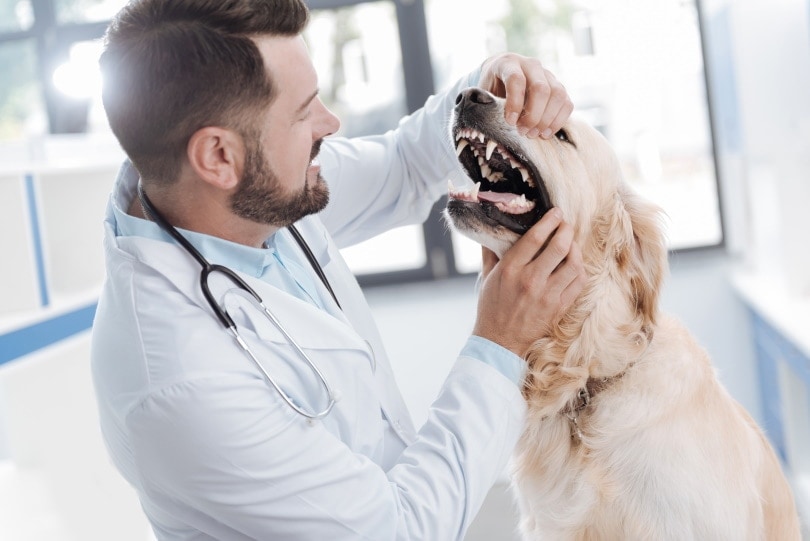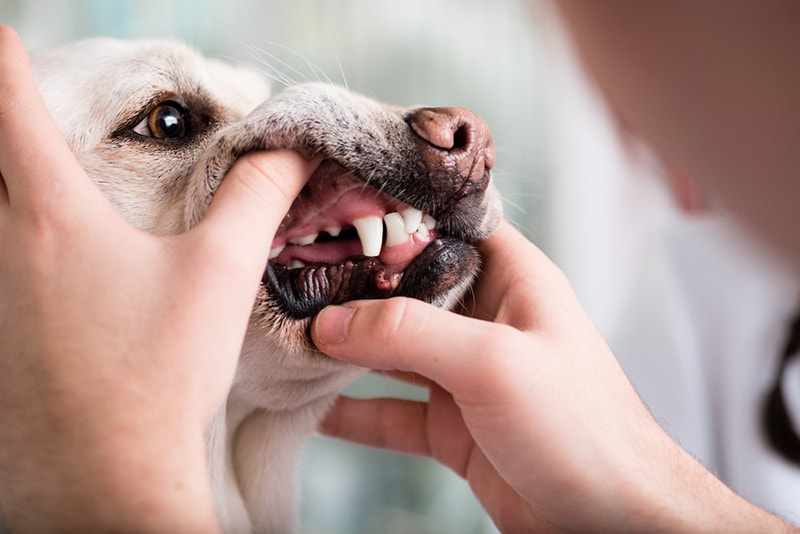8 Mini Goldendoodle Health Issues to Watch Out For (Vet Answer)

Updated on

The Mini Goldendoodle breed is a hybrid breed between a Golden Retriever and a Miniature or Toy Poodle. This breed usually has wavy fur that does not shed much due to their Poodle parent.
Mini Goldendoodles are highly intelligent, athletic, and adorable dogs. They are friendly with children and other pets and have a life expectancy of 10–15 years.
The Mini Goldendoodle is a relatively healthy breed. But since they are a hybrid, they can be affected by health problems specific to the breeds from which they originate. The most common conditions encountered in Mini Goldendoodles include the following.
The 8 Common Mini Goldendoodle Health Issues
1. Von Willebrand Disease
Von Willebrand disease is a condition common to Poodles (especially) and Golden Retrievers. This blood coagulation disorder is hereditary (i.e., from the parents), being one of the most common coagulopathies encountered in dogs.
The breeds affected by this condition have a deficiency or lack the von Willebrand factor, hence the name of the disease. There are three types, type I being the mildest form of the disease and the one found in Mini Goldendoodles.
Type I is usually discovered accidentally during routine surgery. In affected dogs, the wounds bleed more than normal, but other than this, they lead a normal life.

2. Hypothyroidism
In hypothyroidism, the thyroid gland produces fewer T3 and T4 hormones than normal. It is a metabolic disease that occurs due to a condition or structural abnormality of the thyroid. There are two forms: congenital (i.e., the dog is born with it) and primary, the latter being the most common form of hypothyroidism found in dogs.
Hypothyroidism is common in Golden Retrievers. This condition begins slowly and is difficult to diagnose. Affected dogs will begin to show clinical signs when the thyroid gland is affected in proportion to 75%.
- Lethargy
- Weight gain
- Fluctuating appetite
- Cold intolerance
- Decreased libido in males
- Hair loss (especially on the tail)
- Hyperpigmentation spots
- Facial edema
3. Elbow Dysplasia
Elbow dysplasia is common in Golden Retrievers, and your Mini Goldendoodle can inherit it from their parent. This condition occurs in the first months of a dog’s life. It occurs slowly but progressively, and affected dogs will gradually develop joint lesions. Dogs with elbow dysplasia can develop osteoarthritis at the age of 10–12 months.
- Lameness
- Elbows being close to the body
- Front paws being open, with the toes pointing outward
- Fatigue
- Stopping often to rest
- Sphinx position
- Remaining motionless
- Refusal to play
- Stopping often
- Lameness
In severe cases, dogs can have swollen, puffy elbows.
4. Hip Dysplasia
Hip dysplasia is a degenerative, congenital medical condition that Mini Goldendoodles can inherit from Golden Retrievers. Dogs with hip dysplasia will show clinical signs with varying degrees of severity from the time that they are puppies. It is a painful disease that severely restricts a dog’s life.
Young dogs (4–8 months) will have a relaxed gait and be reluctant to move. As the disease progresses, affected dogs begin to limp and have trouble standing, and their hind legs become less mobile. Leg muscles atrophy occurs because affected dogs often rest their back legs due to pain and use their front legs more. The muscles surrounding the hip joint can also be painful due to muscle contractions.
Over time, hip dysplasia leads to arthritis.
5. Luxating Patella (Patellar Luxation/Dislocation)
This condition is one of the most common orthopedic conditions in dogs and affects Miniature Poodles. It is a fairly common cause of lameness in dogs, being caused by the displacement of the kneecap from the groove in the femur bone (trochlear groove) that is placed underneath the kneecap.
Luxating patella has four degrees (I–IV), grade IV being the most severe (the patella is permanently dislocated). In half of the cases, patellar dislocation occurs in both knees.
Most affected dogs show intermittent lameness or keep their limb flexed every two to three steps. When both knees are affected, “bunny hopping” can also be observed.

6. Allergies
Your Mini Goldendoodle may be more prone to certain types of allergies because Golden Retrievers are particularly predisposed to them. Golden Retrievers with parents with allergies are more likely to develop allergies themselves. So, if your Mini Goldendoodle comes from a Golden Retriever with a history of allergies, there is a higher chance that your puppy will have the same problems.
Allergies can occur due to environmental factors (dust, pollen, mold, cigarette smoke, etc.), food, or various substances.
- Skin allergies
- Food allergies
- Ear allergies
- Ocular allergies
- Red skin
- Itching
- Excessive scratching
- Hair loss
- Rancid smell of the skin due to the development of secondary bacterial skin infection
- Red, watery eyes
7. Ear Infections
Golden Retrievers and Miniature Poodles are prone to developing ear infections (otitis). As a result, your Mini Goldendoodle can develop them too.
Otitis can be caused by a bacterial infection or by the accumulation of thick and tangled hairs in the external auditory canal. Other causes are represented by dirt deposited in the auditory canal and the existence of other particles. Sometimes, this condition is the result of other infections in the body.
- Shaking of the head
- Pawing at the affected ear
- Excessive scratching
- Yelping
- Brown smelly discharge coming from the affected ear
- Mild hearing loss
8. Progressive Retinal Atrophy
Progressive retinal atrophy (PRA) is a common condition for Poodles and Golden Retrievers. It is a hereditary, degenerative disease that leads to the gradual loss of vision in both eyes. Dogs suffering from PRA do not see well in semi-darkness and darkness in the initial phase. As the disease progresses, daytime vision will also be affected.
PRA has two forms: early onset and late onset. Dogs with early onset begin to show clinical signs from 4 to 6 months of age, and they can be completely blind by the time that they turn 1. With late onset, dogs start to show clinical signs from the age of 2, sometimes even later (6–10 years).
- Refusal to go up or down stairs
- Refusal to go out in the dark
- Hitting surrounding objects (especially in a new environment)
Conclusion
If you breed a Miniature or Toy Poodle with a Golden Retriever, you obtain a Mini Goldendoodle. This hybrid breed may be predisposed to certain medical problems that their parents are prone to. The most common ones are PRA, hypothyroidism, elbow and hip dysplasia, ear infections, allergies, patellar luxation, and von Willebrand disease. It is recommended not to breed dogs suffering from hereditary conditions. Moreover, early testing and periodic veterinary check-ups can detect medical conditions in time for proper treatment. So, to ensure that your Mini Goldendoodle is healthy, take them to the vet regularly.
Featured Image Credit: LouiesWorld1, Shutterstock












